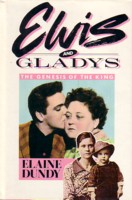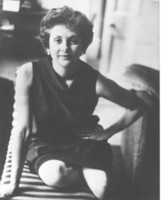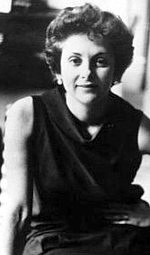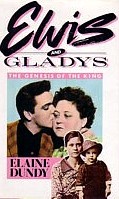

Interview Pt 2: Elaine Dundy, celebrated author of the seminal book, 'Elvis & Gladys: Genesis of The King", talks to EIN
Elaine's other literary works include the best seller, "The Dud Avocado", "The Old Man and Me", "The Injured Party", "Finch, Bloody Finch" (an acclaimed biography of actor, Peter Finch) and her fascinating autobiography (soon to be a film), "Life Itself!" In the first part of her fascinating interview with EIN in 2004, Elaine looks back on her own life, discussing her famous novel, "The Dud Avocado", time spent with "friends" like Ernest Hemmingway, Tennesse Williams, Marilyn Monroe and Marlene Dietrich, how she came to write "Elvis and Gladys" and the often unflattering way Elvis is presented in the media. In this, the concluding part of our fascinating interview, Elaine talks about Elvis' psychological make-up, the impact of his "twin" throughout Elvis' life, his religious upbringing, people who knew Elvis and more. -------------------------------------------------------------------------------- EIN: Another very interesting part of 'Elvis and Gladys' concerned Elvis' childhood fascination with Captain Marvel Jr. Do you see a connection between the Captain Marvel/Freddy Freeman dual identity issue and Elvis' role as one of twins? E.D.: Elvis was a twin whose brother died at birth. For the rest of his life, Elvis would feel loss and guilt but he would also feel something more; something without which we cannot begin to fathom Elvis' character. He would feel triumphant; he was after all, the one who survived. He would relate to friends and lovers with the dependent intimacy of a twin looking for his other half, but always the dominate one. (Note: I never met or heard from an Elvis fan until my book was published. Then from all corners of the earth, it seemed, I was getting mail that had the same story: an unhappy adolescent child with a brutal father and fearful mother and is contemplating suicide but listens to Elvis records and is saved. One boy in a foster home asked me if I knew of an Elvis fan club near where he lived. Elvis's music saved and he knew it.) EIN: Thinking of the nature versus nurture argument, do you think Elvis was self-destructive in the sense that his psychological make-up meant his premature and unfortunate end was inevitable? E.D.: I think of Elvis as a Greek tragedy; chosen by the gods then abandoned by them and to contemplate his story is to be filled with pity and terror. So many legends and religions bump into each other in Elvis' story: Orpheus torn to pieces by the Maenads; the Divine Right of Kings; Judaic and Christian dealings with the Devil. Jesus, tempted by Satan resists with a "get thee hence." Dr. Faustus, said to be Jewish origin, makes his pact with the Devil and ends in hell. Early on Elvis meets Colonel Parker and signs a contract which binds him to the diabolical Dutchman for the rest of his life. Incidentally, I find myself blaming everything Elvis should have done and didn't on the Colonel Parker's pernicious influence Behind Elvis there was another great legend: the metaphysical world of double identity comic book heroes. Elvis' favorite was Captain Marvel Jr., who looks, in fact, exactly like Elvis will make himself look for the rest of his life. Marvel Junior is the most powerful boy in the world. The other identity being the reality of poor, Freddy Freeman but both go about saving the world. EIN: Elvis Monthly once called Elvis films "puppet shows for not over-bright children". Do you share this sentiment or see greater depth particularly in Elvis' early films and those comprising the late 1960s change in direction? Elaine, you were also one of the first to draw attention to recurring themes in Elvis' films that mirrored aspects of his real life, for example the overreaching manager, missing parent, twin motif and Elvis' Indian ancestry. Why do you think these themes were included in his films? E.D.: In the beginning I think they got it right, that on the whole give a good script and a good director and you get a very appealing personality. Later when the interest was only in making money, they had bad scripts, perhaps gingered up by Colonel Parker injecting his wise crack. Basically the films shot in 16 days were solely to make money. But one thing they did was have Elvis meet people as equals, not as inferiors-i.e., Elvis with Hawaiians, Mexicans, and young children and babies whom he magically related. And as I said earlier, he did not get any actor's training. I'm still trying to find out why he didn't get coaching when huge stars such as Brando and Newman did and Montgomery Clift even had his own coach on set on all of his films.
EIN: In your incredible autobiography "Life Itself" you comment that you suddenly realised in your life you had known only celebrities, not any real people, and that meeting the folk of Tupelo changed all that. How did the experience affect you? E.D.: I found the people I met there just as if not more interesting than the celebrities: Roy Turner, Phyllis Harper, Corene Smith-all involved in Elvis's story-I think of as life long friends. It was a liberating as well as learning experience. EIN: You stated that after Elvis' death your curiosity led to you discovering Elvis' musical genius through his gospel LP, 'He Touched Me'. Do you see his religious work as overtly important (as opposed to his ground breaking fifties singles) and how important do you believe "The First Assembly of God" church was in Elvis' success? E.D.: The First Assembly of God, as with so many singers like Jerry Lee Lewis and Dolly Parton, was a major influence in his life. The church, with its emphasis on emotional spontaneity, had not only active preachers, but active congregations. It was Elvis's first exposure to white soul, which is so close to black blues. Specifically as a youngster it gave him a forum, an audience as willing to believe as he was, an audience whose believes were on the same side as his, an audience he could move. No booing or catcalling of any of those performances. It gave him not only confidence, but a caring community and not least, food for him and his family after Sunday church. EIN: Your experience in becoming an Elvis fan mirrors that of many others. You commented that on hearing the LP, "I reacted with the zeal of a convert". What is it about Elvis Presley that not only touches so many people but literally gets inside their skin? E.D.: To produce what Elvis produced in his voice, i.e.- biological aptitude, can be measured and broken down into sense of pitch, timing, harmony, rhythm, and tonal memory, interval discrimination, mode (or chord) discrimination, melodic sequences, and musical imagery, and these are governed by the structure of the vocal cavities, the lips, teeth, tongue, soft palate, jaw muscles, and the thickness in length of the vocal cords. It helps if you had a mother who loves you, grew up in a small town, and was a determined dreamer. Otherwise, it can only be explained by saying he was a prodigy, probably learned it all before he came out of the womb. EIN: Elaine we'd love to quote Gore Vidal who wrote about you "Her life among the lions is not only witty and wise as she brings into focus one husband Kenneth Tynan, one Orson Welles, the one & only Elvis Presley, and not least of all the lioness herself surviving all". That is such a fabulous quote. Do you feel like a surviving lioness?! E.D.: Sure. I also feel living long is the best revenge. EIN Final Comment - You have had the most fantastic life and met the most amazing of people. We only hope that there is something beyond this world and that one day we can share your dinner table with all these fascinating characters that you have known! Elaine Dundy: thank you so much. EIN wishes to thank Joan Gansky for her help in arranging this interview. Click to go to Part 1 of this interview Click here for Roy Turner, Elvis historian, talking about Elvis In Tupelo: Roy Turner is an Elvis Historian who is well-known in the Elvis world for his amazing research into this all-important period of Elvis' past. He was the major source of research behind Elaine Dundy's book 'Elvis and Gladys', has been involved in multiple Elvis projects and was the author of the recent MRS book 'Tupelo's Own; Elvis Presley'. Click to comment on this interview
EIN Website content © Copyright the Elvis Information Network.
Elvis Presley, Elvis and Graceland are trademarks of Elvis Presley Enterprises. The Elvis Information Network has been running since 1986 and is an EPE officially recognised Elvis fan club.
|













